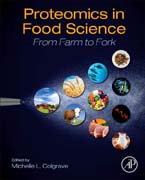
Proteomics in Food Science: From Farm to Fork is a solid reference providing concepts and practical applications of proteomics for those in various disciplines of food science. The book covers a range of methods for elucidating the identity or composition of specific proteins in foods or cells related to food science, from spoilage organisms, to edible components. A variety of analytical platforms are described, ranging from the usage of simple electrophoresis, to more sophisticated mass spectrometry and bio-informatic platforms. The book is designed for food scientists, technologists, food industry workers, microbiologists, and public health workers, and can also be a valuable reference book for students. Includes a variety of analytical platforms, ranging from simple electrophoresis to more sophisticated mass spectrometry and bio-informatic platformsPresents analytical techniques for each food domain, including beverages, meats, dairy and eggs, fruit, fish/seafood, cereals, nuts, and grains that range from sample collection, proportion, and storage analysis Provides applications of proteomics in hot topics area of food safety, including food spoilage, pathogenic organisms, and allergensCovers major pathogens of concern e.g., Salmonella and applications to animal husbandry INDICE: Section 1: Application to plants - Cereals, nuts, pulses and fruits 1. Post-harvest Proteomics of Perishables 2. Proteomics of rice - our most valuable food crop 3. Proteomics as a tool to understand maize biology and to improve maize crop 4. Proteomics of Wheat Flour 5. Barley Grain Proteomics 6. Proteomics of soybean plants 7. Proteomics of hazelnut (Corylus avellana) 8. Proteomics as a tool to study fruit ripening Section 2: Application to farm animals - Meats, dairy and eggs 9. From Farm to Fork: Proteomics in Farm Animal Care and Food Production 10. Proteomics of color in fresh muscle foods 11. Proteomic investigations of beef tenderness 12. Protein modifications in cooked pork products 13. Poultry and rabbit meat proteomics 14. Using peptidomics to determine authenticity of processed meat 15. Proteomic Characterization of the Non-Enzymatic Modifications Induced in Bovine Milk Following Thermal Treatment 16. Proteomics of egg white Section 3: Application to aquaculture 17. Proteomics in aquaculture: quality and safety 18. Proteomics to assess fish quality and bioactivity 19. Proteomic identification of commercial fish species 20. Food authentication of seafood species 21. Proteomic analysis of disease in Sydney Rock Oysters Section 4: Processed foods 22. Proteomics of fermented milk products 23. Proteomic analysis of beer 24. Proteomics of grapevines and wine Section 5: Food spoilage, pathogenic organisms and allergens 25. Proteomics of food spoilage pathogens 26. Biotyping meets proteomics: Mass spectrometry-based approaches for characterization of microorganisms 27. Proteomics analyses applied to the human foodborne bacterial pathogen Campylobacter spp. 28. Proteomic Approaches for Allergen Analysis in Crop Plants 29. Detection of microbial toxins by -omics methods: a growing role of proteomics
- ISBN: 978-0-12-804007-2
- Editorial: Academic Press
- Encuadernacion: Rústica
- Páginas: 538
- Fecha Publicación: 17/04/2017
- Nº Volúmenes: 1
- Idioma: Inglés
